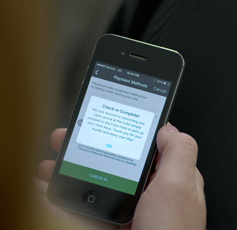MeetingMentor Magazine
Cover Story
Hotels Start to Throw Away the Room Key,But Virtual Entry Faces Hurdles
 Mobile technology is sweeping through the hospitality industry in both the front and back of house, and now it’s coming to the guestroom door. Following the rapid embrace of mobile check-in and check-out, some hotel brands are testing keyless entry — virtual keys — via mobile devices.
Mobile technology is sweeping through the hospitality industry in both the front and back of house, and now it’s coming to the guestroom door. Following the rapid embrace of mobile check-in and check-out, some hotel brands are testing keyless entry — virtual keys — via mobile devices.
Pilot programs. One of the earliest testers is Starwood’s Aloft brand, which targets mobile millennials. It is currently piloting a keyless program in which guests can completely bypass the front desk in two technology hubs — Aloft Harlem in New York City and Aloft Cupertino in Silicon Valley — and at additional global locations. “We have very much taken a start-up mentality,” said a Starwood spokesperson about keyless entry. The timing of the rollout will depend on how fast Starwood can get each aspect of the functionality right. If all goes well, this technology could be rolled out in Alofts and Ws first in 2015. “If we believed [keyless entry] was any less safe than using keys, we wouldn’t do it,” the Starwood spokesperson commented. To that end, instead of using an off-the-shelf software platform, the hotel company has created proprietary keyless technology that prioritizes security and privacy to safeguard guests’ personal information.
Hilton Worldwide recently announced it will enable guest check-in, room selection, special requests and check-out via mobile devices (see photo). Some of these capabilities will be operative by the end of 2014 at 4,000 Hilton properties across 11 brands in more than 80 countries through Hilton HHonors accounts for now, since those members can be securely identified during the check-in process. In 2015, Hilton will begin to enable guest smartphones to unlock their hotel room doors. “Our solution will allow traditional keycards to continue to work alongside the phone-enabled keys,” said Geraldine Calpin, senior vice president and global head of digital at Hilton Worldwide. “We have tested our solution rigorously and fully, and it matches the same tight security standards traditional locks have.”
Still, the technologies do face hurdles before they become industry standards.
Systems integration. “Hoteliers have to maintain the integrity of their technology and information,” said Tom McElroy, CPP, principal and managing member of The Hospitality Security Consulting Group, LLC. “Even with mobile check-in or keyless entry, guests still have to make a stop at the front desk to make sure devices integrate with the hotel systems.” These systems have to know that “this is the appropriate phone or mobile device” for a particular room, he explained, and the proliferation of many different devices and technologies (both U.S. and internationally) adds to the challenge. A big positive, though, comes from the marketing aspect. “If a hotel can get people to employ its mobile technology through its app, it has the opportunity to stay in contact with customers,” said Chad Callaghan, CPP, CSC, CLSD, security consultant to the American Hotel & Lodging Association.
Retrofitting. To replace existing magnetic stripe technology with keyless entry (whether mobile/cellular or near field communications) in a large convention hotel with 1,500 to 2,000 rooms could cost $300 to $400 per door, cited McElroy.
Power. Hotel guests often spend long days traveling and working prior to check-in. That can mean arriving at hotels with no power left in their devices. “Road warriors just want to get into their rooms and get their devices on chargers and don’t want to have to hassle” with new technologies for check-in and keyless entry, McElroy pointed out.
Security. “With keyless entry, you haven’t a clue who you have let into your hotel,” McElroy maintained. One solution: Hotels could access a “mobile” trusted traveler program for identity and credit card information, suggested Callaghan. Another issue: Manufacturers need to employ advanced encryption so that the lock technology is not easily hackable, he said. As well, the lock system has to be able to recognize different levels of key access — for example, the technology must be able to keep doors from opening when the housekeeper walks by with the master key. And in a crisis, a hotel must be able to give responding authorities a complete and accurate rooming list but may not know who is traveling with a guest.
“Every leap in lock technology takes time to catch on,” noted Callaghan. He sees a dual system (key and keyless) operating for a long time to come, as well as keyless technology used for in-room energy management.
In the end, consumers want convenience, but not unless the technology is perfect — “and it’s not there yet,” said McElroy. — Maxine Golding
Free Subscription to
MeetingMentor Online
"*" indicates required fields
About ConferenceDirect
About MeetingMentor